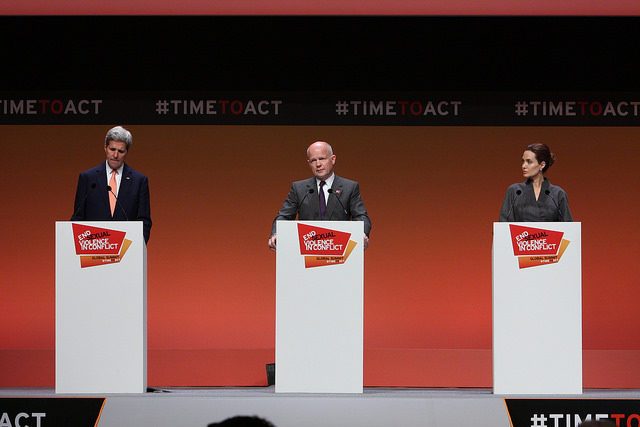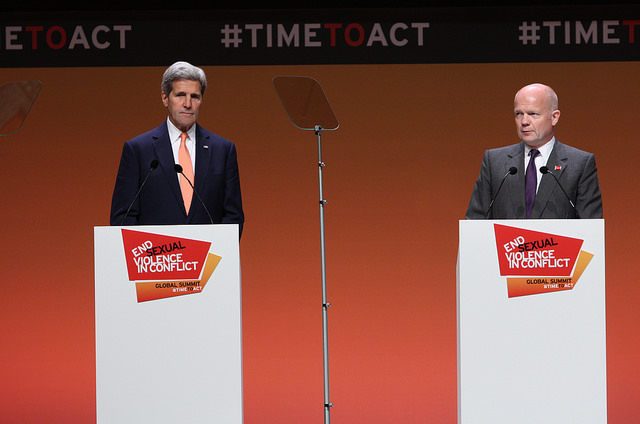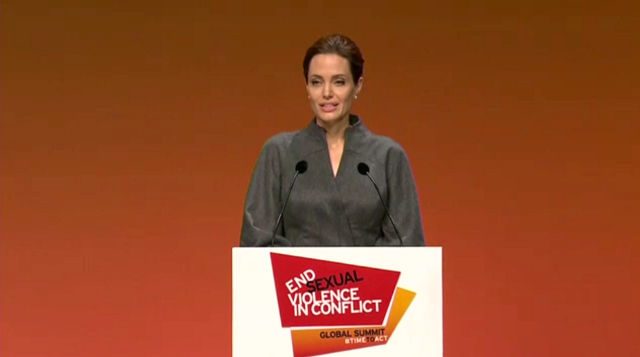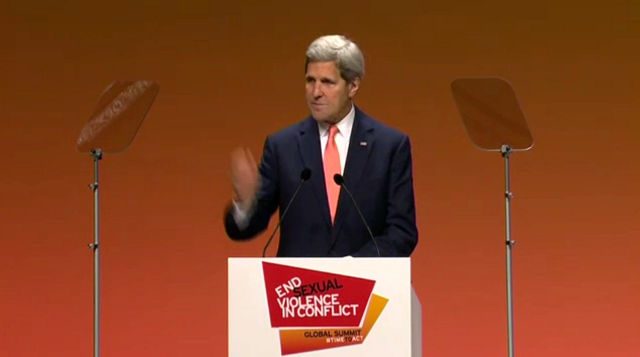SUMMARY
This is AI generated summarization, which may have errors. For context, always refer to the full article.

LONDON, United Kingdom – Just being together onstage was a powerful statement, a harbinger of “the future of foreign policy.”
US State Secretary John Kerry, Britain’s Foreign Secretary William Hague and Angelina Jolie pulled together the violence in Iraq and its roots in Syria with the most pressing call to end wartime rape.
Kerry flew to London to keynote the last day of a 4-day Global Summit to End Sexual Violence in Conflict, co-chaired by Hague and Jolie, on Friday, June 13.
It was surprising that Kerry even made it since he had been in emergency meetings since last week. Violence in Iraq had reached desperate proportions that was demanding immediate US – and global – action.
It was the first issue both foreign ministers addressed when they faced the media.
“President Obama met with his senior foreign policy team yesterday afternoon,” said Kerry. “We had a comprehensive meeting regarding the events in Iraq. We discussed a range of options, including military action to provide support for the Iraqi Government and to respond to their request at this difficult time.”
Britain immediately ruled out military action.

“In the UK, we are not planning a British military intervention,” said Hague. “Clearly, ISIL [Islamic State in Iraq and the Levant] represents a regional challenge.”
Perhaps sensitive to the link to Syria, the US and its allies refer to ISIS, the Islamic State in Iraq and Syria, as ISIL, the Islamic State in Iraq and the Levant.
Regardless of its name, ISIS is the latest mutation of al-Qaeda in the region, using the same terrorist tactics and powered by the same virulent ideology.
“We’re thinking through very carefully the implications of that, and this attack shows the importance of a strong stand against extremists,” added Hague. “That’s why we are giving our backing to moderate groups in Syria who are taking them on.”
There is pressure on the US to provide immediate military support after Iraqi forces effectively abandoned their posts Friday, allowing ISIS fighters to advance to within about 60 miles of Baghdad.
US President Obama laid responsibility firmly on Shiite Prime Minister Nuri al-Maliki and other Iraqi leaders, asking them for political reforms that would lead to cooperation with Sunnis and help end sectarian conflict.
Obama said Iraq’s political dysfunction is why troops abandoned their posts.
“The fact that they are not willing to stand and fight and defend their posts against admittedly hardened terrorists, but not terrorists who are overwhelming in numbers,” said President Obama Friday, “indicates that there is a problem with morale, a problem in terms of commitment, and ultimately that is rooted in the political problems that have plagued the country for a long time.”
Obama announced he “will not be sending US troops back into combat in Iraq,” but would review a range of other options.
When asked about the possibility of airstrikes in Iraq (when it didn’t do that in Syria), both Hague and Kerry left it open.
“I think the answer to why would we do now what we haven’t done in recent months is clearly the situation has changed,” said Hague. “The situation has deteriorated seriously in Iraq. It’s therefore necessary to emphasize and assist with the things that we’ve set out, including stabilizing the situation.”
“Our sense is that there is an ability here to work with the existing government and the existing trained military forces to be able to have an impact in ways that have never been available or as clear with respect to Syria,” said Kerry. “In Iraq, there is a government that we have been deeply involved in, that we support … which has invited us, asked us for help. And under international law, it is clear that when a legitimate nation makes a request for help, there is a legal basis for involvement in ways that are different.”
On Sunday, June 15, the US moved an aircraft carrier into the Persian Gulf and began evacuating its embassy staff from Baghdad.
Latest reincarnation
ISIS is the latest reincarnation of fighters from at least 2 al-Qaeda linked groups that had become so brutal that, at one point, al-Qaeda’s leader Ayman al-Zawahiri distanced al-Qaeda from them.
The group traces its roots to al-Qaeda in Iraq, led by ruthless Abu Musab al-Zarqawi. He tried to ignite a sectarian war between Sunni and Shiite – and nearly succeeded.
The pullout of US troops in 2011, as well as the power vacuum in Syria, has created conditions that led to this weekend’s crisis.
This is perhaps the most alarming resurgence of the radical ideology that gave birth to al-Qaeda. The same pattern, experts warn, seems to be happening again.
Nations around the world, including the United States, Australia, Indonesia and the Philippines, have seen their citizens going to Syria to fight the jihad, similar to what happened in Afghanistan in the late ‘80s.
Rohan Gunaratna, author of Inside al-Qaeda and head of the International Center for Political Violence & Terrorism Research (ICPVTR) in Singapore, estimates at least 200 Australians, at least 30 Indonesians and several Filipinos have fought in Syria, a magnet for jihad.
The fear is, like in Afghanistan, the terrorist techniques they learn in combat would find their way home, reminiscent of the Bali bombings in 2002 and 2005 and the Superferry bombing in the Philippines in 2004.
Iraq is only the latest flashpoint in a long-evolving, clearly global, threat.
“We have been warning for months now,” said Kerry. “The increased number of jihadists attracted to Syria … is creating a danger to the region in the spillover violence and the spillover humanitarian crisis.”
That is where Angelina Jolie came in.

It’s unprecedented that at such a crucial point, a Hollywood star would be sharing the stage with key leaders of the western world.
Not just a women’s issue
Ending warzone rape is a key focus for Jolie, who’s hinted of leaving her acting career to perhaps pursue this issue.
“Warzone rape is not simply a women’s issue. It is not a humanitarian issue,” said Jolie. “It goes to the heart of international peace and security.”
When conflict breaks and war happens, law and order breaks down. Women are vulnerable, and rape often goes hand-in-hand with war. At those times, men rape with impunity.
It is happening now in Syria, and perhaps in Iraq.
Hague said he wasn’t sure they had evidence from “the last few days, but we do, of course, have evidence of it on a huge scale in the Syria conflict. And indeed, we have deployed the UK team of experts to Syria’s borders to help to document these crimes and to support human rights activists in doing so.”
“These issues are all tied together,” Jolie said. “There is not one that is more important than the other, but we must address them all at once.”
The end of the summit proved exactly why its goals are important: because as leaders, experts and civil society speak, civilians are threatened daily.
“The work we have begun here is very, very much linked to the violence against women in many other contexts, whether it is the kidnap of the schoolgirls in Nigeria or the recent appalling rape cases in India and Pakistan,” Jolie explained.
Over 84 hours, ministers from more than 123 nations along with experts who spent a year working on an International Protocol, a best-practices handbook for handling investigations and documenting sexual violence in conflict, came together with survivors and civil society organizations in a Fringe event open to the public.
Passion simmered beneath the surface, powered by personal commitment, starting with co-chairs Hague and Jolie.

Kerry echoed that in his keynote: “This issue should be personal to all of us. It really should be. I know it’s become personal for me.”
“We’ve seen new support for survivors, new determination to tackle impunity, and a new International Protocol, new support for affected countries, new commitments on women’s participation and conflict prevention and peace-building,” Hague noted. “We have raised awareness dramatically across the world on this issue.”
Both the US and Britain pledged new money.
At the end, despite the crisis, there was much hope.
“This summit has brought together leaders, survivors, and experts from around the world in an unprecedented way,” said Jolie. “I see this as a new and hopeful model for how we can begin to tackle vast global issues and strengthen the rule of law and justice internationally.” – Rappler.com
Related stories:
- Ending warzone rape: A cause for our generation
- Two Filipinas represent PH in London global summit
- Angelina Jolie co-hosts London summit vs sexual violence in conflict
- Jolie: We can end use of rape as weapon of violence
- Jolie, Hague mobilize global action vs rape in war
- Jolie and Hague launch International Protocol for sexual violence
- Brad Pitt adds support to Jolie at warzone rape meeting
- AS IT HAPPENS: Summit to end sexual violence: Ministers’ Day
- AS IT HAPPENS: Summit to end sexual violence: Closing plenary
- Nigerian schoolgirls ‘a heinous example of sexual violence’
- #TimeToAct Hangout: End Sexual Violence in Conflict
- Angelina Jolie, warzone rape, and the celebrity effect
- Banish sexual violence ‘to dark ages’ – Kerry
- Was Maleficent ‘raped’?
- Britain makes Angelina Jolie an honorary dame
- The passion of Angelina Jolie
Add a comment
How does this make you feel?
There are no comments yet. Add your comment to start the conversation.